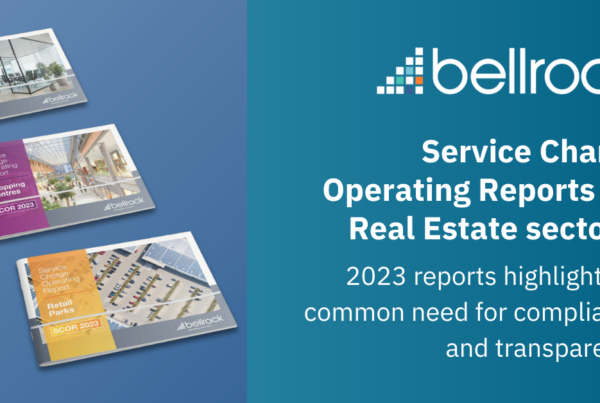Accounting practice within the commercial property sector needs improving. Our expert Andrew Morley sets out the issues that need to be addressed to create a more consistent, transparent process across the board.
Service Charge remains one of the most contentious aspects of commercial property. There are a number of reasons for this, and poor accounting practice is undoubtedly a contributory factor.
The Royal Institute of Chartered (RICS) published a Professional Statement (now Standard) in 2018 which became effective on 1 April 2019. Its content is mandatory for regulated firms and members. Whilst this means that some landlords and organisations operating in the property management sector are not bound by its mandatory provisions, it is widely accepted as a reference point for best practice.
Given that service charge represents the costs incurred by a landlord in the delivery of services, it follows that correct accounting practice is essential. Bellrock’s own research demonstrates that the RICS’ aspirations for improvement in management practice have not been realised despite the initial interest of many agents to ensure compliance and avoid adverse reporting.

Andrew Morley MRICS ACIArb
Andrew is a leading service charge expert with over 35 years’ experience, specialising in property and construction disputes and matters relating to landlord and tenant relationships. He has acted as an expert witness on numerous occasions and was a quantum expert in a multi-million High Court case in 2017. Andrew was instrumental in the launch of the highly regarded annual SCOR report that benchmarks service charge payments and management to the RICS code of practice.
Correct accounting should provide the financial governance upon which the management and recovery of service charge is based. Whilst there are many practical issues, it is often at an organisational level that errors are introduced (this comment goes beyond the subject of service charge). For example, the process of paying suppliers by reference to purchase orders often fails to test the adequate delivery of services or compliance with contract terms. This problem may arise from a lack of management process or systems which prevent appropriate scrutiny and sign-off at various levels.
In practice, this problem can manifest itself at building management level where the staff concerned do not have defined delegated authorities, have inadequate training and in some instances, may not have sight of the service contracts upon which those managers are expected to post payments. The point here is that good accounting process relies upon joined up management.
The problem with budgets
Budget production is the responsibility of the property manager. However, budgets are often inaccurate resulting in adverse cashflow to tenants with delayed reconciliation at year end. The Professional Standard requires that budgets should be produced at least one month before the start of the service charge year. There remains a significant number of instances where this does not occur. Leases in contrast, in the absence of a budget, usually permit a landlord to continue making quarterly demands at the previous year’s level. This could result in capital expenditure being double counted and / or excessive on accounts being collected, for example following some major works expenditure.
At this point it should be recognised that given current levels of inflation and the volatility / uncertainly of energy markets, budget forecasting has become much more difficult.
Occasionally during a service charge year, a landlord may want to increase a budget due to omissions or perhaps decisions during the course of the service charge year to commit to capital expenditure. Whilst this can occur for good reason not all leases permit mid-year on-account adjustments to be made. Occupiers need to look carefully at their lease terms when this occurs.
Budgets should only relate to costs that properly comprise services defined in leases. Some leases may permit the operation of reserve or similar funds, and you may wish to refer to our previous article The Use or Abuse of Funds.
Good accounting practice should allow the landlord or agent to regularly report on actual vs budgeted expenditure (including accruals) together with an updated re-forecast of the year end position. This would be more consistent with how most businesses manage their own accounts and it is difficult to see why it should not apply equally to landlords or their agents.
At the end of the service charge year the service costs should be certified and reconciled as soon as practicable. Typically, this should be achievable within three months and the Professional Standard recommends the reconciliation to occur within four months. Bellrock’s own research [Service Charge Operating Reports] indicate that there is still much more to be done to achieve this.
Cash vs accruals: it’s a problem area
Service charge accounting is either undertaken on a cash or accruals basis. The latter is most common. However, despite RICS attempts to provide better definition of accruals, it remains a problem area. This can have a significant impact on an occupier’s contributions particularly at lease expiry, the exercise of a break option or surrender, whereby an occupier may well be paying for work that is to be undertaken beyond term for which it has no strict liability.
Typically lease terms say that the year-end certificate is conclusive or binding save for manifest error. There is much case law that assists in understanding what a definition of manifest may be. In a service charge context, it is unlikely that the limited information contained on a year-end certificate is sufficient to allow mistakes to be identified that may be considered to be manifest errors. It is suggested that the only way in which this could be achieved is to make available to occupiers or their advisors a full transaction list. However, any expert interrogation of the transactions may be said to be going beyond what is commonly understood to be the basis for a manifest error. This is an issue for further debate and possibly acceptance by the industry that occupiers must be supplied with all reasonable evidence of cost incurred.
Not all service charge accounts at year end are subject to audit. Many leases do not require an audit to be undertaken. However, standards of audit that are undertaken by third party accounting firms are often not defined and the sign-off wording is inadequate. The Institute of Chartered Accountants in England and Wales (ICAEW) Technical Paper that was published in 2014 (in parallel with the 2014 Code) paved the way for accountants’ reports which have been adopted by many firms. Again, there are issues with clarity of the scope of the accountant’s report and findings, and the evidence of the sign-off remains an area for improvement.
Balance sheets would offer transparency
Very few service charge accounts are completed with a published balance sheet. That has been raised with RICS and it is hoped that it will be included in future updates of the Professional Standard, for those buildings where it is appropriate.
Not only would balance sheets provide valuable information on the status of funds at year-end, it would give some information on arrears status and an indication of any meaningful issues in managing the account. These can manifest themselves not only due to tenant arrears or withholdings possibly due to a dispute, but where landlords contributions for void liability or for contributions being required in excess of tenant’s caps, have not been made.
There are a number of other issues concerning accounting practice which this article has not elaborated on. However, they do include the incorrect allocation of credits (often associated with double counting of out of hours costs), transfers and write-offs.
In summary, accounting practice is an area in which improvement is needed and consistency needs to be achieved across the sector. Until this occurs it will remain the case that occupiers need to apply a significant degree of qualified scrutiny across their service charge cost liability.







